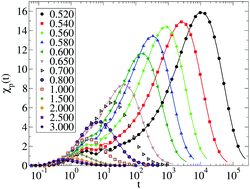Pinning susceptibility: a novel method to study growth of amorphous order in glass-forming liquids†
Abstract
The existence and growth of amorphous order in supercooled liquids approaching glass transition is a subject of intense research. Even after decades of work, there is still no clear consensus on the molecular mechanisms that lead to a rapid slowing down of liquid dynamics approaching this putative transition. The existence of a correlation length associated with amorphous order has recently been postulated and has also been estimated using multi-point correlation functions which cannot be calculated easily in experiments. Thus the study of growing amorphous order remains mostly restricted to systems like colloidal glasses and simulations of model glass-forming liquids. In this work, we propose an experimentally realizable yet simple susceptibility to study the growth of amorphous order. We then demonstrate the validity of this approach for a few well-studied model supercooled liquids and obtain results which are consistent with other conventional methods.



 Please wait while we load your content...
Please wait while we load your content...